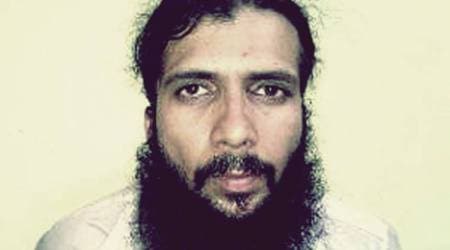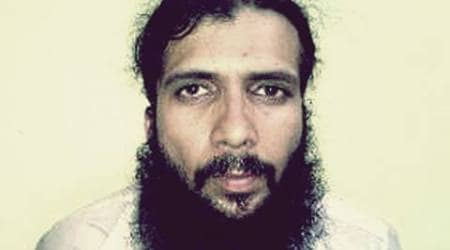 Indian Mujahideen co-founder Yasin Bhatkal. (File Photo)
Indian Mujahideen co-founder Yasin Bhatkal. (File Photo)
Seven years after the Jama Masjid terror attack, a city court Tuesday ordered framing of charges on August 29 against alleged Indian Mujahideen co-founder Yasin Bhatkal and 10 other accused in the case. Additional Sessions Judge Sidharth Sharma said there was prima facie evidence against Bhatkal and the other IM operatives. The court also discharged three other accused in the case over lack of evidence.
The case dates back to September 2010, when two motorcycle-borne persons fired at Taiwanese nationals outside Jama Masjid’s gate number 3. Soon after, a bomb fitted on a parked car nearby exploded. A total of 11 people, including Bhatkal, were arrested. In 2015, three others — all of them from Bengaluru — were made accused in the case. The three had been arrested in a separate case in Bengaluru, and had allegedly admitted before police that they had delivered explosives to one of the accused in the Jama Masjid blast case.
However, the court on Tuesday discharged the three men — Syed Ismail Afaaque, Abdus Saboor and Riyaz Ahmad Sayeedi — in the Jama Masjid blast case on the grounds that it did not find “any evidence” against them. They had been charged with criminal conspiracy, destruction of evidence and other offences under the Indian Penal Code, apart from the Unlawful Activities (Prevention) Act and the Arms Act. One of the accused is an MBA graduate, another a homeopathy doctor and the third a student. All three had moved bail applications in the same court last year.
Counsel for these three accused, M S Khan, submitted before court that during the investigation, no material evidence of any nature had been found by police against the three men. “Even in the disclosure statements of the co-accused (in the Jama Masjid case) — Aftab Alam and Ahmed Siddibappa (Yasin Bhatkal) — neither is there any reference to, nor any description of these accused persons,” stated the counsel of the three men.
He added that the only material against them is their disclosure statements, allegedly made during their interrogation in Bengaluru in a different case, which is “not admissible”. The counsel for the three men cited Section 25 and Section 26 of the Indian Evidence Act, which state that a “confessional statement” made by the accused while in custody cannot be proved against the accused.
“As an exception, Section 27 of the Evidence Act provides that a confessional statement made to a police officer or while an accused is in police custody can be proved against him if the same leads to the discovery of an unknown fact, and admittedly there is no discovery of any unknown fact,” stated the submission made by the counsel to the court.

